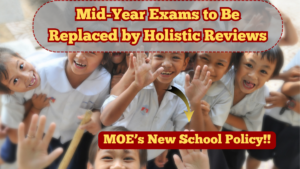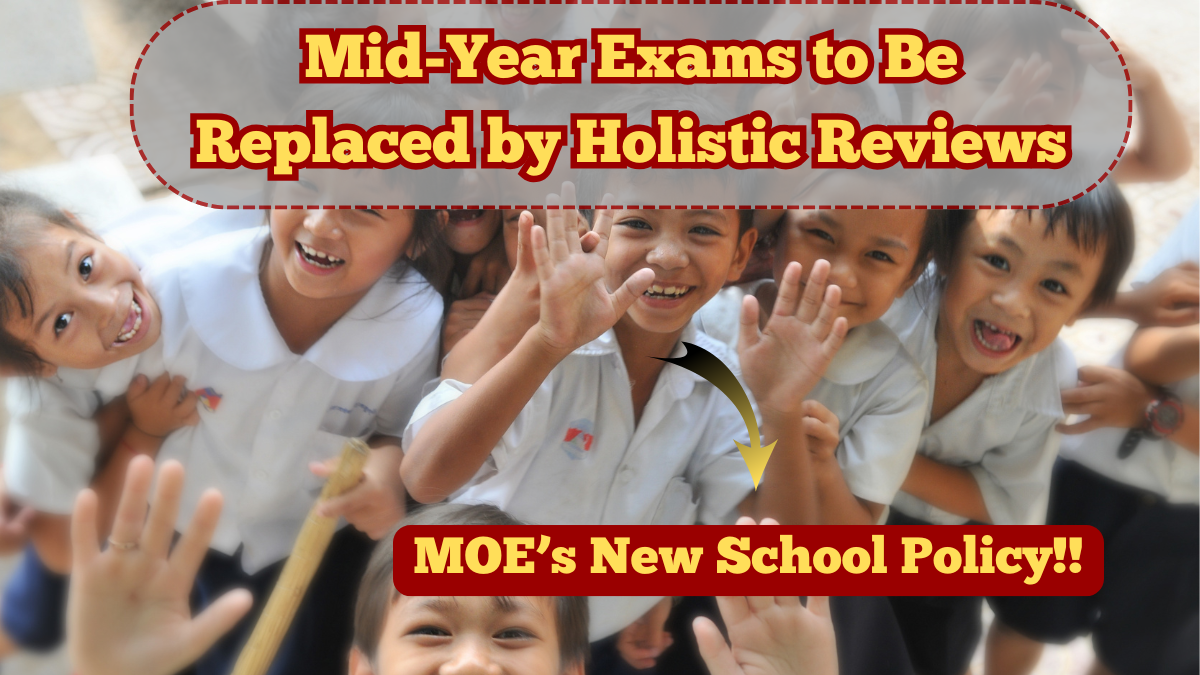In a major step to reform the education system, the Ministry of Education (MOE) Singapore has announced a policy shift for 2025. Mid-year exams will be replaced by holistic reviews as part of updated school-based assessment (SBA) strategies. This move aligns with broader education reforms to reduce exam pressure and improve student well-being.
The initiative will impact all mainstream and specialized primary and secondary schools by the end of 2025.

Why MOE Is Eliminating Mid-Year Exams
The decision is driven by the need to address mental health concerns and support more diverse learning approaches. Students and parents have long expressed concerns about exam-related anxiety, and this new policy attempts to alleviate that by offering more balanced evaluations.
By removing mid-year exams, the MOE aims to:
-
Lower stress levels among students
-
Encourage creativity, participation, and independent thinking
-
Provide teachers with better tools for SBA and progress tracking
-
Allow more time for project-based learning and enrichment activities
This marks a significant update in the MOE exams system and shows a commitment to meaningful education reforms.
What Are Holistic Reviews?
Holistic reviews are evaluations that assess students based on a broader set of criteria beyond written tests. This includes:
-
Daily assignments and class involvement
-
Teacher observations and feedback
-
Project work, oral presentations, and peer assessments
-
Self-reflection and portfolio submissions
The SBA model ensures that different learning styles are acknowledged, allowing students who excel outside traditional exam formats to thrive.
Who Will Be Affected by the New SBA Model?
The changes will apply progressively to the following groups:
-
Students from Primary 3 to Primary 6
-
All Secondary 1 to Secondary 5 students
-
Students in specialized institutions with tailored SBA implementation
This update to MOE exams policies is part of a long-term effort to foster a more student-centric learning experience in Singapore.
How Students and Parents Can Adapt
Both students and parents should begin preparing for the shift in mindset and expectations. Since grades will be de-emphasized in favor of qualitative feedback, learning behaviors will play a more central role.
Parents are encouraged to:
-
Reinforce the value of participation and effort over scores
-
Support children in setting learning goals
-
Monitor classroom feedback and communicate with teachers regularly
Students should focus on:
-
Being active in class discussions and group projects
-
Completing all daily work with attention to detail
-
Reflecting on feedback and developing personal learning strategies
Long-Term Benefits of the New Education Reforms
These changes bring several advantages:
-
Reduced academic stress and exam fatigue
-
More inclusive learning that accommodates different strengths
-
Enhanced collaboration and communication skills
-
Stronger emotional and social development alongside academic progress
The updated SBA approach ensures that every student’s capabilities are better represented and valued.
A Shift Towards Future-Ready Learning
Singapore’s education reforms reflect the nation’s commitment to producing not only high-achieving students but also resilient, adaptive individuals. This change in MOE exams policy is more than administrative—it is philosophical, reshaping how success is defined in schools.
FAQs
What is replacing the mid-year exams in 2025?
Holistic reviews under the new SBA model will replace mid-year exams. These include continuous assessments, project work, teacher feedback, and student reflections.
Why did MOE decide to remove mid-year exams?
The MOE removed mid-year exams to reduce student stress and allow a more balanced approach to learning. This is part of a broader push for education reforms.
Will final-year exams still take place?
Yes, final-year exams will still be conducted, but schools will complement them with SBA components to ensure a more comprehensive assessment.
Does this apply to all schools in Singapore?
Yes, the change applies to all mainstream and specialized schools. International schools may choose whether or not to adopt the policy.
How should parents help their children adapt?
Parents can encourage consistent effort, praise holistic achievements (not just grades), and maintain open communication with teachers about their child’s progress.
Click here to know more.
Aanchal is a passionate writer with a keen interest in storytelling, content creation, and creative expression. She enjoys exploring diverse topics and crafting engaging narratives that captivate readers.




